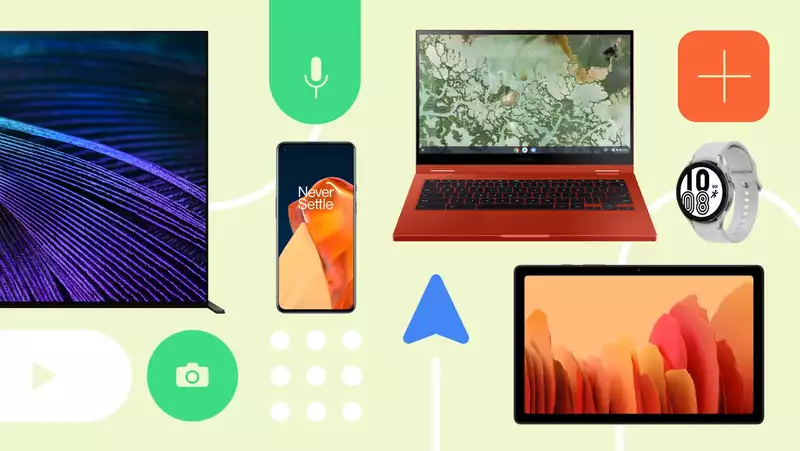Google wants its Android software to work well with other devices. And while the software giant joined other companies in exiting the CES 2022 trade show, they still have a big event this week to announce some upcoming Android changes that should help your phone work in concert with smartwatches, PCs, cars and other devices Uses.
There's a reason Google is so keen on making Android work seamlessly with multiple devices. The company notes that the number of connected devices in the average home will jump to 25 by 2021, up sharply from 11 just two years earlier.
"We want to be responsive wherever our users are," says Ronald Ho, group product manager for multi-device experiences at Google.
The changes detailed by Google today (January 5) will roll out to Android throughout the year, with some becoming available in the coming weeks. Below is how Google intends to make Android work with other devices.
If you have Bluetooth headphones, you are probably familiar with Android's Fast Pair feature; Fast Pair allows you to pair Bluetooth accessories to your phone quickly and easily.
Google plans to expand Fast Pair's capabilities starting with Chromebooks. In a matter of weeks, your Chromebook will be able to detect when you turn on your Fast Pair-enabled headphones and you will be able to connect the two with a single click. Similarly, Fast Pair is adding support for Matter-enabled smart home devices, allowing them to connect to your home network as well as the Google Home app and other related apps. [Fast Pair-enabled headphones will be able to connect to Google TV and devices running the Android TV OS. But the biggest enhancement will come later this year, when Fast Pair will be available to set up a new Chromebook from a paired Android phone. This feature will allow users to quickly transfer information already stored on their phones, such as Google logins and Wi-Fi passwords.
Mobile phone manufacturers seem to be focusing on turning cell phones into digital car keys for unlocking cars. Apple has built such a feature into iOS, and Google announced a month ago that both the Pixel 6 and Galaxy S21 will act as digital car keys to unlock some BMW models in some countries.
Later this year, Google said, you won't even need to take your phone out of your pocket to unlock your car. Android phones with Ultra Wideband will be able to unlock these BMW models using the proximity feature. (Additionally, an update coming to Android this year will allow users to share virtual keys with friends and family to unlock the cars they are renting.
Some devices will enjoy this unlocking capability long before cars; just as Android phones can now unlock Chromebooks, in a few months, Wear OS watches will be able to unlock Chromebooks and Android phones and tablets when they are nearby.
Other changes promised by Google fall into the broad category of easily exchanging tasks and media like music and photos between different connected devices. For example, Google is building Bluetooth headphone technology that will allow automatic switching between devices, such as switching to an Android phone to answer an incoming call while watching a movie on a tablet. This feature, along with spatial audio that is positioned based on head movements, should be available within a few months.
Google is also making changes to the Phone Hub on Chromebooks. First, Camera Roll will be added, giving users one-click access to recent photos and videos stored on their phones. Later this year, users will be able to access them from their Chromebooks without having to install a mobile chat app, even if their phone is not nearby.
Google plans to expand the voice remote actions already available to manage smart devices from the car. In the coming months, users will be able to control their cars from the comfort of their homes. Among the voice commands Google plans to add are the ability to adjust the temperature of the car and lock and unlock the doors through Google Assistant-enabled devices. Volvo cars will be the first to support these functions.
Finally, more audio manufacturers will add Chromecast support to their devices, allowing users to share music and podcasts from their phones. All Bose soundbars and smart speakers will have Chromecast built in within a few months.
Android phones will soon become an essential tool for setting up Window PCs. Later this year, with the help of Fast Pair, you will be able to set up Bluetooth accessories, sync text messages, and share files using your Android phone; HP, Acer, and Intel are among the companies working with Google on this feature.
All of these companies are working with Google on this feature.
In addition to all of these features, Google also made clear that Android Auto and some changes that will be introduced this year to cars with Google support built into the infotainment system.
Android Auto is set to include point-of-interest apps like MochiMochi, Fuelio, and Pezzi Bezzina this summer to help you explore, track your mileage, and pay for various car services; Lyft and Kakao Mobility are also planning to integrate their apps into Android Auto as well, which should help drivers who use these services.
Cars with Android Automotive OS-based infotainment systems are adding voice commands for features such as lane-keeping assistance and confirmation of upcoming service appointments.
.









Comments